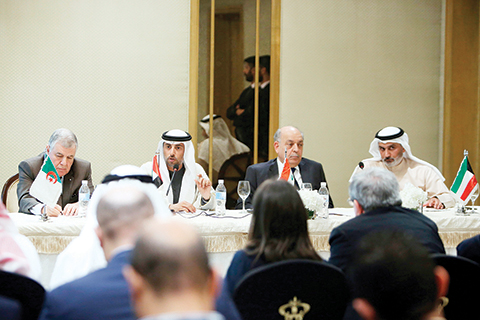
KUWAIT: Oil
ministers from leading OPEC nations said yesterday they expect prices will
arrest their recent slide and rebalance early next year, when a deal on new
production cuts takes effect. Oil prices have shed more than 36 percent since
early October to trade at $54 per barrel, due to fears of oversupply and weak
global demand. But president of OPEC and UAE Energy Minister Suhail Al-Mazrouei
said that the surplus in the oil market was small compared to 2017 and expected
it to vanish in one or two months.
"Based on
available figures, we have around 26 million barrels of surplus ... compared to
340 million barrels in early 2017," Mazrouei told a press conference in
Kuwait. "I think that we can easily do with this surplus and reach market
rebalance in one or two months... in the first quarter of next year," he
said. OPEC - a cartel of producer countries that has long manipulated output of
the commodity, to influence global prices in members' favor - and non-OPEC
members agreed in early December to trim production by 1.2 million barrels a
day from Jan 1, in a bid to shore up sagging prices.
Mazrouei said oil
output by OPEC producers will be cut by three percent, and two percent by
non-OPEC countries. He said that there has been higher than anticipated supply
on the market in recent months, as US sanctions on Iran have had a less
pronounced effect on the country's oil exports than had been expected. On US
President Donald Trump's call on the producers to slash crude output, Mazrouei
said: "We solely consider the facts and market balance...we are committed
to serve our states' interests."
Iraq's Oil
Minister Thamer Al-Ghadhban said that there is a consensus among OPEC and
non-OPEC producers to comply with the new agreement to trim output in a bid to
stabilize the market. He said the new agreement is valid for six months and the
ministers will meet in April to assess the impact of the cuts. Ghadhban said he
believes that the new measures taken by producers will "stop the slide in
oil prices."
Ghadhban also
said that his country is expected to put its final touches on the agreement of
exporting gas to Kuwait. He said that the agreement was made during mandate of
the previous Iraqi government, and "we will consider the agreement and
make our decision based on positive data". "I cannot say that I have
any remarks on the agreement because we have exported gas to Kuwait in the
'80s, but we all know that Iraq has a big need for gas, especially in generating
electric power," Ghadhban said. "The two sides negotiated several
days ago on the borderlines between Kuwait and Iraq and studies have been made
with engineers and technicians to make the area beneficial for both
sides," he added.
Mazrouei said that
producers are ready to renew the agreement or increase cuts in case the market
does not balance. "If the production cuts of 1.2 million barrels a day is
not enough, we will meet again to see what is enough and apply it," he
said. During their meeting next April, the producers are also expected to sign
a long-term agreement to formalize cooperation between OPEC and non-OPEC
members over oil output. OPEC has lately been cooperating closely with Russia
and other non-cartel producers, in a bid to impose greater control over global
output and prices. - Agencies










